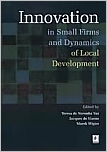Książka jest analitycznym studium procesów innowacji w małych przedsiębiorstwach
oraz roli tych przedsiębiorstw w dynamizowaniu rozwoju lokalnego. Empiryczną podstawę
pracy tworzą wyniki badań przeprowadzonych w 7 krajach (Belgia, Francja, Irlandia,
Polska, Portugalia, Wielka Brytania i Włochy). Autorzy przedstawiają modele opisujące
zdolność małych firm do innowacji, a także ujmujące wzajemne zależności między
zmianami technologicznymi i lokalnymi kontekstami. Książka wydana w języku angielskim.
This book provides an analytical study of innovation in small enterprises and its role
in the dynamics of local development in lagging areas.
It also evaluates the effect of the local environment on the innovative potential of
small firms. Agriculture plays an important part in many of the lagging areas in Europe
which tend to be rural in nature. The food and drink manufacturing industry, which may be
a significant driver of growth in such areas, forms the focus of the study. The empirical
work is based on firm level and regional economic data collected in a set of contrasting
areas drawn from seven countries, namely Belgium, France, Ireland, Italy, Poland,
Portugal, and the UK.
The major challenge in this research was to formulate models reflecting not only the
firms' capacity to innovate but also the interdependencies that exist between the
technological changes occurring in small firms and their different local contexts. Small
firms face continuous threats to their competitiveness and their survival is connected to
institutional and regional economic dynamism. Most of the emphasis within the analyses
presented here is on identifying methods of technological and organisational learning and
on investigating productive interactions and networking with industrial partners, local
institutions and other economic agents. Quantitative methods are developed to detect
different behavioural patterns among the firms. New strategic policy choices and proposals
to help promote small firms and regional development are advanced on the basis of the
findings.
Authors: Teresa de Noronha Vaz, Marek Wigier, Eleanor J. Morgan, Nick Crawford,
Stefano Gonano, Gabriele Canali, Tessa Avermaete, Jacques de Viaene, Fatiha Fort, Ariel
Meunier, Jean-Louis Rastoin, Leila Temri, Carlos Noeme, Francois M. Nicolas, Eamonn Pitts,
Iwona Szczepaniak.
Teresa de Noronha Vaz and Marek Wigier
1.Introduction
References
Teresa de Noronha Vaz
2.The environmental context for small firms in the EU
2.1 Introduction
2.2 Innovation and the knowledge base
2.3 Territory, co-operative choices and collective learning
2.3 Networking and systems of territorial production
2.4 Governance and power in organisations
2.5 Industrial models and structural change
2.6 A new contribution: the interface of theory and practice
2.7 The model
2.8 Defining territorial systems
2.9 Identifying innovative models of Smali and Medium Enterprises
2.10 Conclusion
References
Eleanor J. Morgan and Nick Crawford
3.Research design: Territorial systems and the enterprise survey
3.1 Introduction
3.2 The European food and drinks processing industry
3.3 Description of the territorial systems
3.4 The fieldwork survey of smaller enterprises
3.5 Conclusion
References
Stefano Gonano and Gabriele Canali
4.Interregional comparison of the territorial systems
4.1 Introduction
4.2 Differences between economic systems
4.3 Analysis of added value by sector
4.4 Cross-country characterisation
4.5 Conclusion
References
Tessa Avermaete, Jacques de Viaene, Eleanor J. Morgan and Nick Crawford
5.The impact of firm characteristics and macroeconomic performance on innovation
in smali food firms: Case study from Belgium, Ireland and the UK
5.1 Introduction
5.2 Focus on four determinants of innovation
5.3 Methodology
5.4 Results
5.5 Conclusion
References
Fatiha Fort, Ariel Meunier, Jean-Louis Rastoin and Leila Temri
6.Modelling results: Identification of innovation models
6.1 Introduction
6.2 Conceptual model
6.3 Methodology
6.4 Evidence of innovation
6.5 The innovation model
6.6 Cluster analysis of the typology of innovative firms
6.7 Innovation performance factors
6.8 General discussion and conclusion
References
Carlos Noeme and Francois M. Nicolas
7.The processes of technological learning and co-operation in small firms
7.1 Innovation in SMEs as a result of co-operative and innovative activities
7.2 Concepts
7.3 Measuring co-operative and innovative activities in the territories
7.4 Developing a model
7.5 Methodology
7.6 Analysis of results
7.7 Analysis of results considering all the enterprises
7.8 Identifying a single innovation factor
7.9 Conclusion
References
Annexes
Eamonn Pitts, Marek Wigier and Iwona Szczepaniak
8.Regional policy: Analysis of the environment promoting technical innovation
8.1 Regional policy - theoretical aspects
8.2 Regional development policies in practice
8.3 Synthesis of regional policy approaches
8.4 Evaluation of the impact of the regional policy on innovation .
8.5 Regional policy in a European context
8.6 Implications for accession countries
References
Teresa de Noronha Vaz
9.Strategies for regional development: The effect of policy makers and historical
institutional change
9.1 Introduction
9.2 Regional policies versus development complexities
9.3 Case Studies on the strategies used for development purposes of some European regions
9.4 Conclusion
References
Jacques de Viaene and Tessa Avermaete
10.General discussion and conclusion
10.1 Introduction
10.2 Towards a new methodology to evaluate innovation in small low technology firms
10.3 Innovation dynamics of small food firms revisited
10.4 Policy implications
10.5 Areas of future research
References
Appendix
About the Authors
258 pages, Hardcover
Księgarnia nie działa. Nie odpowiadamy na pytania i nie realizujemy zamówien. Do odwolania !.


